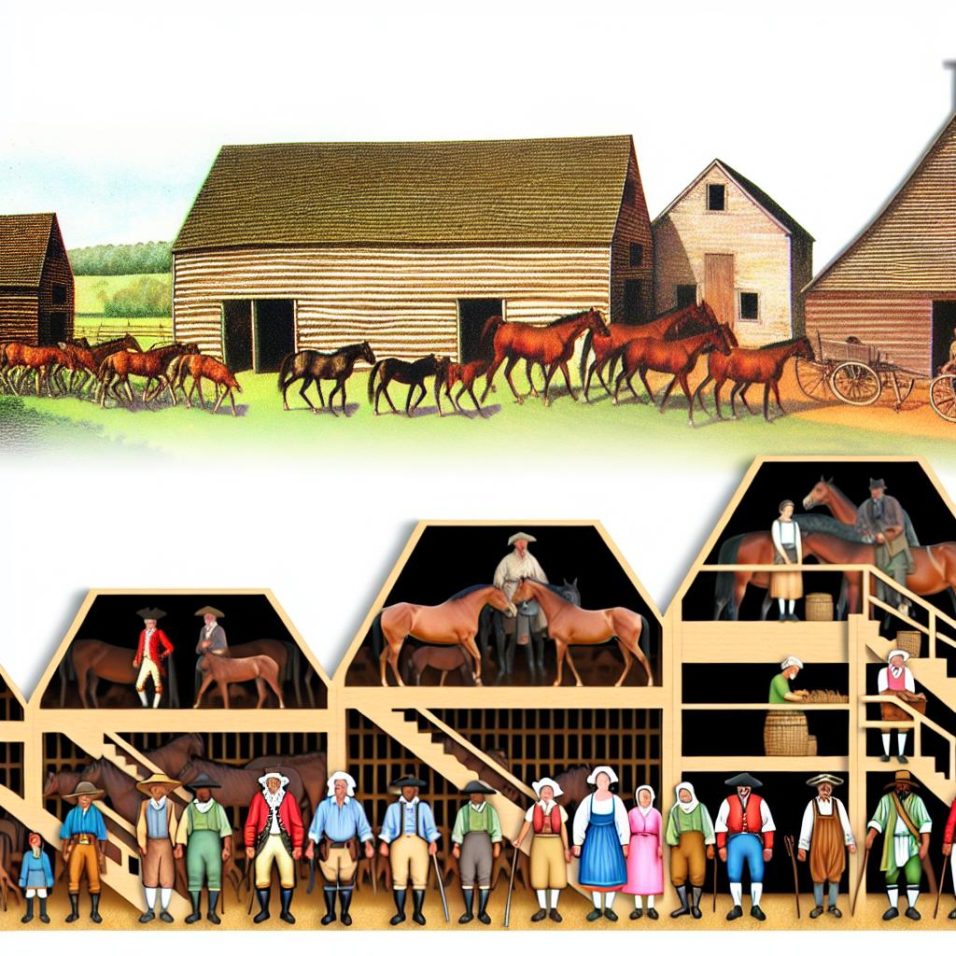The Early History of Horse Farms in Virginia
Virginia, renowned for its lush landscapes and agrarian culture, has a storied history deeply intertwined with horse farming. This history stretches back to the early days of American colonization when the first settlers sailed to the New World, accompanied by horses. Horses were not only pivotal for transportation but were also integral to agricultural endeavors. This fact underscores how essential these noble animals were in shaping the development of early American society.
The Beginnings in the 17th Century
As settlement expanded, so did the importance of horses in various facets of daily life. By the 17th century, Virginia’s vast expanses of fertile soil and the favorable climate provided an ideal setting for breeding and raising horses. These conditions facilitated the establishment of numerous horse farms, each contributing to the growth of a burgeoning equine culture.
Colonial Era to 19th Century
During the colonial era, horses were primarily utilized for labor-intensive work. Their strength and reliability made them invaluable assets on farms, where they plowed fields and transported goods. However, as the century progressed, the dynamics began to shift. More sophisticated breeding techniques emerged, spurred by a growing interest in improving horse lines for specific functions.
By the 18th century, horse racing captured the public’s imagination and became a popular pastime. This new interest heralded the onset of breeding programs aimed at developing distinct breeds suited for racing and competitive events. The epicenter of this transformation was the Chesapeake Bay region, recognized for its favorable horse farming conditions.
Influence of the American Revolution
The American Revolution marked a turning point for horse farming, exerting a significant influence on the industry. The conflict heightened the demand for robust horses, especially for military purposes. Virginia breeders responded adeptly, focusing their efforts on breeding programs that emphasized both strength and endurance. This period saw a notable transformation in breeding priorities to meet the needs of a nation at war.
19th Century Developments
The 19th century ushered in a phase where thoroughbred racing gained immense popularity, with Virginia taking center stage in this equine spectacle. Renowned horses emerged during this period, alongside notable breeders who cemented Virginia’s reputation in the racing world. Their contributions to horse farms led to expansions, with an increased focus on breeding horses specifically for racing performance.
20th Century Transformations
The dawn of the 20th century brought transformative changes to Virginia’s horse farms, driven largely by sweeping technological advancements and significant economic shifts.
Mechanization and Urbanization
The advent of mechanization resulted in a decreased reliance on horses for both farming and transportation. Machinery began to replace horses in many traditional roles, prompting horse farms to adapt by specializing in recreational and competitive equestrian activities. Concurrently, urbanization, especially in regions like Northern Virginia, contributed to a shift away from large-scale agricultural farming toward more niche equine pursuits.
World War II and Beyond
World War II further influenced the direction of horse farming, as resources across the nation were largely diverted for the war effort. Nonetheless, in the post-war era, there was a renewed interest in recreational riding and equestrian sports. This renewed enthusiasm catalyzed the maintenance and expansion of horse farms and reaffirmed their place in Virginia’s landscape.
Equine Health and Technology
Advancements in veterinary medicine and equine-specific technology throughout the 20th century revolutionized horse breeding and care. These scientific and technological improvements bolstered the health, longevity, and overall well-being of the horses, contributing to a more robust and dynamic industry. Better-maintained horse populations ensured that Virginia continued to play a pivotal role in the equine world.
Present-Day Horse Farms in Virginia
Today, Virginia continues to be a vital hub for horse farming, blending historical traditions with contemporary innovation. The state’s horse farms cater to both local interests and global markets, illustrating an industry that remains vibrant and diverse.
Contemporary Breeding and Equestrian Activities
Modern horse farms in Virginia are multifaceted, engaging in an array of equestrian activities. These include breeding thoroughbreds for competitive racing and training horses for dressage and show jumping. Additionally, there is a growing trend toward adopting sustainable agricultural practices. This trend reflects a dual focus on advancing economic goals while being mindful of ecological responsibilities.
Equestrian Events and Community
Virginia continues to host numerous equestrian events that attract participants and spectators from far and wide. These events not only celebrate the state’s rich equestrian heritage but also provide substantial economic benefits to local communities. Tourism, hospitality, and related industries thrive as they cater to event attendees. Horse shows and races remain key elements in promoting and preserving Virginia’s storied equestrian culture.
Resources and Organizations
Several pivotal organizations function in Virginia to support and enhance the horse farming industry. These entities provide an array of resources and valuable support to horse breeders and farm owners. They play a crucial role in maintaining industry standards and ensuring the sustained quality of equine activities throughout the state.
In summary, the evolution of horse farms in Virginia is a compelling narrative of adaptability and perseverance. By honoring its historical legacy while embracing modern advancements, Virginia continues to be a cornerstone in the equine industry. For those interested in learning more about the state’s dynamic horse farming scene, a variety of equestrian resources are available online.


